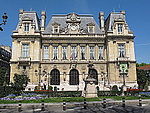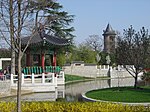Synagogue de Neuilly
Algerian-Jewish culture in FranceBuildings and structures in Hauts-de-SeineByzantine Revival architecture in FranceByzantine Revival synagoguesOrthodox synagogues in France ... and 1 more
Synagogues completed in 1878
The Synagogue of Neuilly-sur-Seine, located at 12 rue Ancelle, built in 1878, is the oldest synagogue in the Paris suburbs of France.
Excerpt from the Wikipedia article Synagogue de Neuilly (License: CC BY-SA 3.0, Authors).Synagogue de Neuilly
Rue Jacques Dulud, Arrondissement of Nanterre
Geographical coordinates (GPS) Address External links Nearby Places Show on map
Geographical coordinates (GPS)
| Latitude | Longitude |
|---|---|
| N 48.880833333333 ° | E 2.2683333333333 ° |
Address
Synagogue de Neuilly
Rue Jacques Dulud
92200 Arrondissement of Nanterre
Ile-de-France, France
Open on Google Maps






